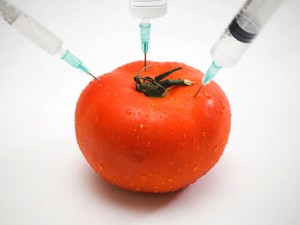 For nearly 2 decades, since 1996, GMO (genetically modified organism) foods have been part of your food supply. Some groups that include doctors, nutritionists, and social activists feel these foods are not Mother Nature made creations. However, at this time there is insufficient long-term research data to know if these foods are unhealthy for consumers. That brings us to the topic of today’s article – what are the issues with GMO foods and should you be concerned about them.
For nearly 2 decades, since 1996, GMO (genetically modified organism) foods have been part of your food supply. Some groups that include doctors, nutritionists, and social activists feel these foods are not Mother Nature made creations. However, at this time there is insufficient long-term research data to know if these foods are unhealthy for consumers. That brings us to the topic of today’s article – what are the issues with GMO foods and should you be concerned about them.
To Label or Not To Label
What’s so bad about GMO foods? For one thing, GMOs are genetically different from the foods humans evolved with. As a result, your DNA may not work properly with them and could lead to disease.
Research studies have shown that lab rats have not been able to metabolize GMO foods in the same way as non-GMO food. Though rats and humans are different creatures, they are both mammals with digestive systems that function in a similar manner. If rats have trouble metabolizing GMO foods, there is a good chance your digestive tract will behave the same, leading to the assumption that GMO foods could be unsafe for human consumption.
That’s why grass roots campaigns like “Just Label It” and the “California Right to Know” have organized an effort to get GMO foods labeled. “Just Label It” was successful in collecting over 1,000,000 signatures from consumers around the country, prompting farm bill amendments that call for the labeling of GMO foods, by Senators Bernie Sanders of Vermont and Barbara Boxer of California.
These groups propose that people have the right to know exactly what they are eating. Despite all the signatures and the fact that 90% of Americans want to know the content of their food, the bill to label GMO foods did not pass Congress back in June of 2012.
Scientific American recently cited [Rat Study Sparks Furor Over Genetically Modified Foods, September 2012], a French study published in Food and Chemical Toxicity, showing an association between GMO foods and the growth of tumors, as well as liver and kidney damage in rats eating Roundup-resistant corn. There is also the possibility that GMO foods may cross-pollinate with non-GMO foods and cause ecological problems.
Promoters claim that GMO foods keep costs down and that they are completely safe based on data supplied, mostly from the makers of GMO foods, Monsanto and Dupont Corporations. According to their records, no toxic effects have been reported anywhere they have been consumed. The objection is that labeling GMO foods would give them an unnecessarily bad reputation and destroy the businesses that create and distribute them, not to mention the argument that GMO labeling could add about $400 a year to everyone’s food bills.
Proposition 37 – California Leading the Fight
The United States is the biggest producer of GMO foods followed by Argentina, Canada, Brazil, China and South Africa. Other countries, like India, are in favor of labeling GMO foods. On November 6, California voters will get the chance to cast their vote on labeling legislation under Proposition 37. The passage of Proposition 37 will require that all GMO foods in the state of California be labeled as such as well as prohibit any products that contain GMO foods from being labeled as “all natural”.
This could significantly impact the processed foods industry – snacks, packaged foods, etc. In addition, saying Yes to Prop 37 in California may set the precedent for all states to clearly label GMO foods for consumers. To date, the Monsanto Corporation has donated over $4.2 billion for voters to say No on Prop 37. The FDA also opposes labeling GMO foods as they feel the extra labeling confuses consumers.
GMO Foods and the Non-GMO Project
Stick to foods labeled USDA/Organic if you want to avoid GMO foods. Keep in mind that organic food, by U.S. law, can have up to 5% non-organic ingredients. Most organic producers strive for 100% organic product but there is some risk from cross contamination by nearby fields growing GMO products.
The food groups listed below are known GMOs. Please note the percentages next to them, which will tell you how much of the total U. S. crop for this product are GMOs. Currently, there are no animal-based GMO products on the open market but there is a high risk of cross contamination from their feed. Unless the packaging states “non-GMO”, it’s not possible to know if processed food ingredients are GMO or natural. They are:
- Soy – 93%
- Corn – 86%
- Cotton – 93%
- Canola oil – 90%
- Sugar Beets – 95%
The Non-GMO Project is dedicated to building sources of non-GMO products, educating consumers and offering verified non-GMO choices. Their website lists verified non-GMO brand name food products and a lot of information about the non-GMO initiative. If you are interested in learning more about non-GMO foods, please see their website link in references.
I believe that everyone has the right to know the contents of the food they eat to enable him or her to make the healthiest food choices. I encourage you to learn more about GMO foods, the non-GMO project and take a stand on the side of the issue you support.
Stay Well,
Mark Rosenberg, M.D.
Natural Health News
GMO Labeling Bill Faces Industry Opposition, http://www.manufacturing.net/articles/2012/10/gmo-labeling-bill-faces-industry-opposition
GMO Labeling Bill Fails To Pass In Senate, ivn.us/2012/06/21/gmo-labeling-bill-fails-to-pass-senate/
What is the difference between a rat and a human digestive system, http://wiki.answers.com/Q/What_is_the_difference_between_a_rat_and_a_human_digestive_system
The Non-GMO Project, http://www.nongmoproject.org/learn-more/what-is-gmo/
photo credit: cbsnews.com
